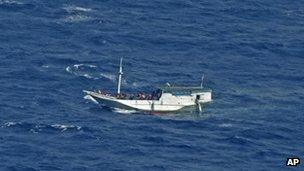Australia asylum: MPs back offshore processing
- Published

Australia has seen an increase in asylum seekers arriving by boat in recent months
Australian MPs have approved laws allowing offshore processing camps for asylum seekers to be re-established in Papua New Guinea and Nauru.
The lower house passed a bill presented to parliament on Tuesday, following recommendations from an expert panel.
The bill now goes to the Senate, where it is expected to pass in coming days because both the governing Labor Party and the opposition back it.
Labor, under former Prime Minister Kevin Rudd, closed the camps in 2008.
The debate on the legislation in the lower house lasted for six hours on Tuesday and continued the next day. Only two MPs - an independent and one from the Australian Greens party - voted against the bill.
Immigration Minister Chris Bowen, speaking before the vote, said it was important that the bill pass.
"The Australian people expect no less and the people smugglers fear nothing more," he said.
Prime Minister Julia Gillard - whose party had until Monday opposed the move - said on Tuesday that she hoped processing centres for asylum seekers could be reopened "within a month".
Recommendations
The vote followed the release on Monday of a report by an expert panel , externalappointed by Ms Gillard to break the deadlock on the issue of asylum.
It set out 22 recommendations aimed at tackling people-smuggling issues, including re-opening mothballed offshore processing centres.
The move comes amid rising numbers of asylum seekers travelling to Australia by boat from Indonesia.
Officials reported that at least three boats carrying more than 150 people were intercepted on Tuesday.
Australian officials say offshore processing is needed as a deterrent against making the perilous journey - pointing out that many lives have been lost in sinkings in recent years.
But critics say the policy - known as the Pacific Solution before it was scrapped in 2008 - violates asylum seekers' rights.
In the past detainees on Nauru mounted multiple hunger strikes to protest against both conditions and the length of their detention.
Small protests against offshore processing have been reported outside immigration offices in Sydney and Melbourne.
Melissa Park, a Labor MP, earlier said that the measures being debated were "at the lower end of what we are capable of as a nation".
"There are strong concerns about the devastating consequences, including severe mental health issues of detention of asylum seekers for indeterminate periods on Nauru and Manus Island," she said.
The Pacific Solution was introduced in 2001 by the government of John Howard, in response to a reported rise in the number of asylum seekers arriving by boat.
Processing centres were set up on Nauru and on Manus Island in Papua New Guinea, the governments of the two nations receiving millions of dollars in aid in exchange.
The Australian navy diverted all boats carrying asylum seekers to those camps, where many were detained for months - sometimes years - under high security.
Many Australians did support the policy but rights groups condemned it and accused Australia of failing to meet its obligations under refugee conventions.
- Published15 August 2012
- Published13 August 2012
- Published28 June 2012
- Published25 June 2012
- Published22 June 2012
- Published24 January 2012
- Published19 December 2011